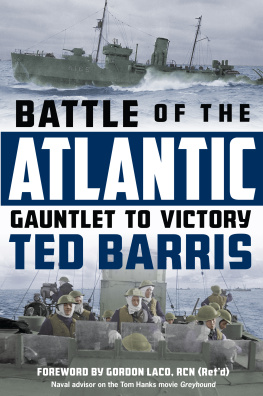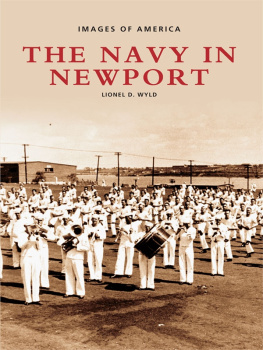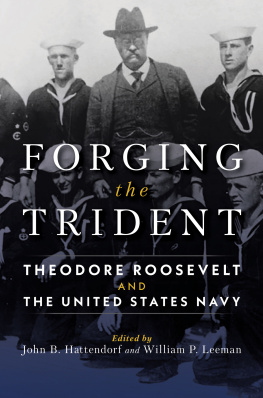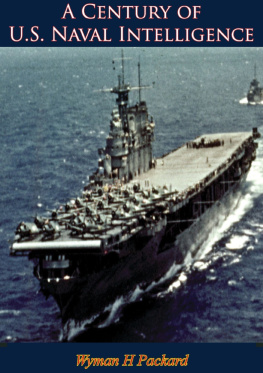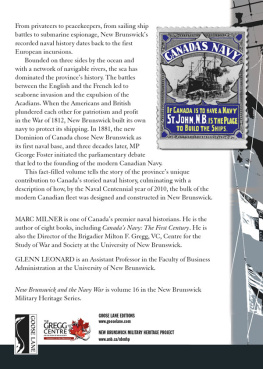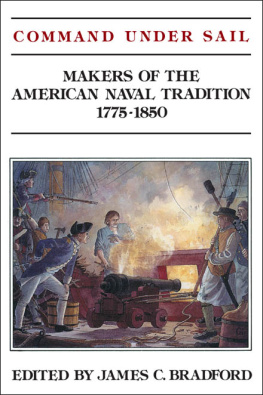THE
ADMIRALS
LEADERSHIP
THE
ADMIRALS
Canadas
Senior Naval
Leadership
in the
Twentieth Century
Edited by
Michael Whitby
Richard H. Gimblett
and Peter Haydon

Copyright Her Majesty the Queen in Right of Canada, 2006
as represented by the Minister of National Defence.
All rights reserved. No part of this publication may be reproduced, stored in a retrieval system, or transmitted in any form or by any means, electronic, mechanical, photocopying, recording, or otherwise (except for brief passages for purposes of review) without the prior permission of Dundurn Press. Permission to photocopy should be requested from Access Copyright.
Copy-editor: Lloyd Davis
Design: Jennifer Scott
Printer: Webcom
Library and Archives Canada Cataloguing in Publication
Whitby, Michael J. (Michael Jeffrey), 1954
The admirals : Canadas senior naval leadership in the twentieth century / Michael Whitby, Richard H. Gimblett, and Peter Haydon.
Includes bibliographical references.
ISBN-10: 1-55002-580-5
ISBN-13: 978-1-55002-580-4
1. Admirals--Canada--Biography. 2. Canada. Royal Canadian Navy--Officers--Biography. 3. Canada--History, Naval--20th century. I. Gimblett, Richard Howard, 1956- II. Haydon, Peter T. (Peter Trevor), 1935- III. Title.
FC231.W44 2005 | 359'.0092'271 | C2005-906318-1 |
1 2 3 4 5 10 09 08 07 06

We acknowledge the support of the Canada Council for the Arts and the Ontario Arts Council for our publishing program. We also acknowledge the financial support of the Government of Canada through the Book Publishing Industry Development Program and The Association for the Export of Canadian Books, and the Government of Ontario through the Ontario Book Publishers Tax Credit program, and the Ontario Media Development Corporation.
Care has been taken to trace the ownership of copyright material used in this book. The author and the publisher welcome any information enabling them to rectify any references or credits in subsequent editions.
J. Kirk Howard, President
Printed and bound in Canada.
www.dundurn.com
Dundurn Press
3 Church Street, Suite 500
Toronto, Ontario, Canada
M5E 1M2
Gazelle Book Services Limited
White Cross Mills
Hightown, Lancaster, England
LA1 4X5
Dundurn Press
2250 Military Road
Tonawanda, NY
U.S.A. 14150
THE
ADMIRALS
CONTENTS
by Vice-Admiral R.D. Buck
by Michael Whitby
Richard H. Gimblett
William Glover
Roger Sarty
Marc Milner
Richard Oliver Mayne
Wilfred G.D. Lund
Wilfred G.D. Lund
Michael Whitby
Peter Haydon
Robert H. Caldwell
FOREWORD
It was my pleasure and privilege to attend the Sixth Maritime Command Historical Conference in Halifax in 2002, the proceedings of which this volume records.
Canadas foremost naval historians presented a range of biographical and professional studies of the Chiefs of the Naval Staff and other influential Royal Canadian Navy senior officers from our founding in 1910, through the world wars and inter-war years, Korea and the Cold War, to our transformation in 1968. The scope of these scholarly enquiries is thus comprehensive; they are of sufficient depth and originality to provide us with genuinely new insights into an important part of modern Canadian history.
Most fascinating to me were the reminiscences of six of my predecessors, retired Commanders of Maritime Command, including Admirals Timbrell, Porter, Fulton, Thomas, George and Anderson. Their participation added a credible degree of relevance to the proceedings.
This volume outlines and examines the challenges associated with senior naval leadership within the sometimes fraught context of Canadian federal politics as well as period strategic geopolitics. It offers a valuable collection of case studies into the nature of leadership, from which present and future naval personnel (and, I would hope, those who aspire to a career in politics) can learn a great deal.
To paraphrase the novelist, while all happy admirals resemble one another, each unhappy admiral is unhappy in his own way. Perhaps more so in Canada than elsewhere in the Commonwealth or NATO, there has always existed a tension between the navy and governments of the day. This tension, I believe, has more to do with ignorance of our role and capabilities than any more sinister explanation, despite such unnerving (to Ottawa) precedents as the putting to sea of the fleet during the 1962 October Crisis.
My tenure was served in times of peace and war. Peace was better. For much of the time since September 2001, we have seen nearly the entire fleet serve a succession of arduous rotations as part of Operation Apollo, the first and most consistently applied response of Canada to the ongoing war on terror. Every sailor in a seagoing billet wears the ribbon. Every staff member and civilian employee has, to a greater or lesser degree, been affected, whether by greater workloads or neglected projects. Training, maintenance, refits, life-extensions, capital procurements, quality of lifeall these have suffered. But despite everything, the United States Navy welcomes our ships as fighting units that can be relied upon, whether as fully integrated units within their Carrier battle groups, or as multinational task force leaders, or as amphibious assault group escorts, or in any number of other roles across virtually the entire operational spectrum. This is an achievement of which the whole navy can be proud, and it is a result of clear leadership whose strategic vision for the naval forces of Canada remainedand remainssharply focused on making sure that our task groupbased capability and effectiveness survive. For it is only by maintaining a medium-level navy, deployable around the world, that we can best serve the interests of Canada and Canadians.
In sum, I cannot say with hand on heart that I have been any unhappier than any of my predecessors, nor can I claim the opposite. We have all had successes and disappointments. And we have all had, by necessity, to confront our assumptions (monumentally self-evident to us) about why our country needs a navy, and thus justify our continued existence. This has always been an irony to me, given Canadians warmly-embraced idea that we count and are involved meaningfully in the wider world. But this struggle will continue far beyond my time.
The torch will be taken up by the cream of our wonderful peoplethe properly trained naval officer, the steadfast non-commissioned officer and the well-trained rating. Their good work, in keeping with our finest traditions as well as new ways of thinking and doing, will at the end of the day persuade Canadians what a superb resource they have in their navy.
Next page

